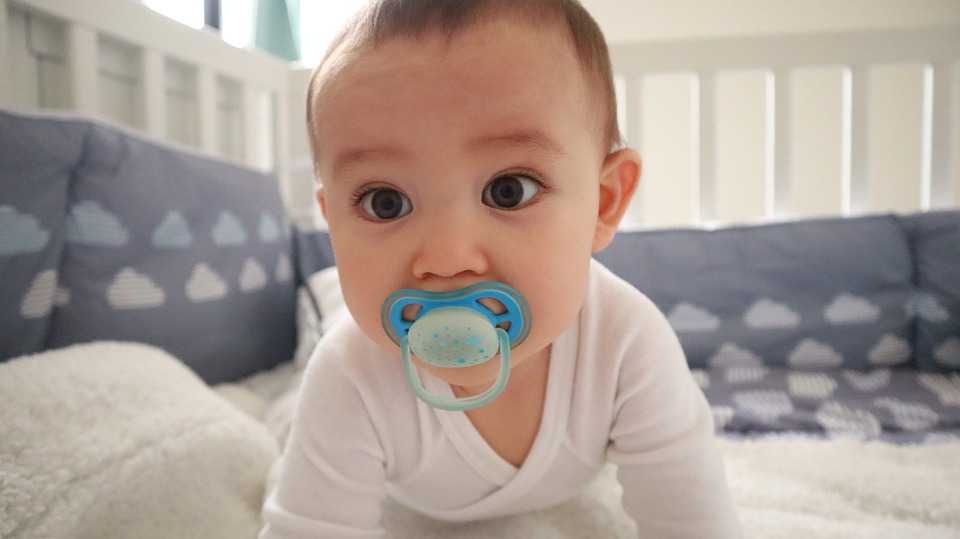A good bite is key to a beautiful smile. As well as socializing with peers and boosting self-confidence, it helps to prevent problems with your baby’s articulation and breathing. Many think that it’s too early to think about a bite while your baby still has milk teeth. But it’s not just about teeth: the teeth are, in the first place, the position of the upper and lower jaws in relation to each other. And it starts to develop from the very first days. For this reason it is important to know what foods and habits can distort a child’s bite and which ones will help it to develop properly.
The dummy on the baby bottle
Your baby is newborn. He or she does not yet have any teeth, but the initial position of the jaws is already set. Orthodontists have a special term for their jaw alignment: “infant retro generation”. This means that the lower jaw is bent slightly backwards in relation to the upper jaw. Almost all babies are born with this “malocclusion”, but within 6-8 months the position of the jaws usually aligns. Doctors say that bite correction requires active work on the jaw and face. When a baby is breastfed, for example, he or she has to work hard to get nutrition. If a baby drinks from a normal bottle, it spends much less effort to suck it and its jaws do not work and develop sufficiently.
Thanks to modern developments, even artificial feeding is not an obstacle to the correct bite of the baby. The most important thing is to pay attention to the flow rate. The more freely the liquid flows from the bottle, the less the jaws work. The nipple should therefore be selected so that the baby has to “extract” the milk with the same effort as when breastfeeding. This will not only give the baby the training it needs, but also no excuse to stop breastfeeding, which is labor-intensive for it. Nowadays, some brands have special product lines to help take care of your baby’s bite from the time he’s a baby. Philips Avent, for example, has a range of Natural bottles. Their physiological nipples have a slow, “tight” flow and resemble the shape of a woman’s breast. This design encourages your baby to get a better grip and sets the stage for healthier bites.
Dummy
A dummy is important for a baby’s peace of mind. It makes your baby feel comfortable. However, soothing your baby is not its only function. Your baby already has an innate sucking reflex of two kinds. The “nutritional” sucking allows extracting milk from the mother’s breast; the “non-nutritional” sucking is not used to obtain food, but is also necessary for child development, e.g. it produces a hormone which helps digestion and alleviates colic. It also helps develop coordination (combining sucking, breathing and swallowing) and encourages the development of facial muscles.
A dummy can prevent quite serious damage that a baby can do to itself. If the reflex is not satisfied enough, your baby might pull a finger into his mouth. But finger sucking, which is often perceived as a harmless baby habit, can lead to a deformation of the palate, which in newborns is soft and pliable. A stiff finger literally leaves a mark on it. An age-appropriate orthodontic dummy prevents this from happening. It prevents pressure on the palate and gums and encourages symmetrical mouth development. Most Philips Avent orthodontic dummies have a teardrop-shaped nipple and the mouthpiece on the Ultra Air range also has large airflow holes to prevent skin irritation. A soother can help with a baby’s development – the key is to offer it only when your baby really needs it. As your child gets older, it is best to gradually limit its use. This is easier than weaning your child from thumb-sucking.
Drink bottles
Drink bottles can be offered to your baby from 6 months of age. Teaching your child to drink from the spout or tube will help to develop the facial muscles and stimulate the development of the speech apparatus. Care should be taken to ensure that the drinker is designed to fit the baby’s mouth. If dentists were involved in the design, this is an additional reason to look at the product. It is best to start with a teapot with a spout and progress to a more complex tube as the child grows older. The different movements will help the mouth to develop and the teeth to bite properly. Non-pouring teapots are best, as this reduces the chance of your child getting dirty and damaging clothing or upholstered furniture, for example. A suitable sippy cup, with the convenient pouring spout cap or snap-on tube cover, is available from Philips Avent. The brand develops all its products in partnership with doctors and has won 6 independent People’s Choice Parenting Awards 2019.
Good bite in your baby doesn’t only mean using the right products at the right time. It is also important to ensure good oral hygiene, avoid developing bad habits such as finger sucking and make sure your baby has his or her first appointment with the orthodontist at 3 or 4 years of age.
